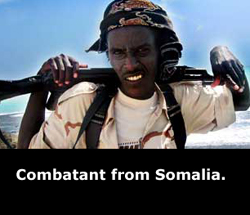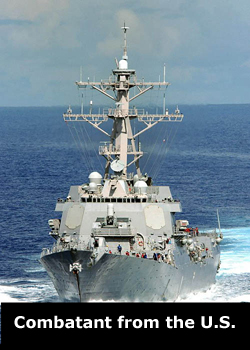As some of you know, I’ve been around more than a few years (get off my lawn, you kids!), so I’ve heard my share of  triumphalist rhetoric about some military action against a “worthy” opponent. But the U.S. Navy vs. some teenage pirates… that’s about as lopsided a contest as I can imagine. Sure, they needed to get that ship captain out alive. Perhaps there was no other way to resolve the standoff – I can’t say, really. But this is nothing to crow about, and certainly not some enormous success that strikes a blow against tyranny. These pirates are desperate young men driven to a bandit’s life by circumstances we can barely comprehend. The very life’s blood of international commerce flows right past their shores in the form of these enormous freighters and tankers, and they see this as a meager opportunity to scrape some wealth out of a global system that passes them by. Not surprising that they grasp this nettle, even at risk of life and limb.
triumphalist rhetoric about some military action against a “worthy” opponent. But the U.S. Navy vs. some teenage pirates… that’s about as lopsided a contest as I can imagine. Sure, they needed to get that ship captain out alive. Perhaps there was no other way to resolve the standoff – I can’t say, really. But this is nothing to crow about, and certainly not some enormous success that strikes a blow against tyranny. These pirates are desperate young men driven to a bandit’s life by circumstances we can barely comprehend. The very life’s blood of international commerce flows right past their shores in the form of these enormous freighters and tankers, and they see this as a meager opportunity to scrape some wealth out of a global system that passes them by. Not surprising that they grasp this nettle, even at risk of life and limb.
I, of course, have listened to NPR and other news sources in vain to hear someone give some meaningful background on why the Somali coast has become the piracy capital of the modern world. One would think we would hear something about the fact that the U.S. government had supported Ethiopia’s invasion of Somalia in December 2006, which overthrew the nascent national government of the Union of Islamic Courts. The Bush administration accused the Union of being in league with Al Qaeda, but (as was typical for them) offered no proof of same. In any case, the Ethiopians had received millions in military assistance and were happy to act on our behalf, with the support of U.S. air power, intelligence, and special forces participation. Perhaps 10,000 have been killed since then, with as many as a million refugees. Just as bad, Somalis have seen a return to near-total chaos, marked by growing civil conflict and a breakdown in even basic government services. Controlling piracy is not at the top of their to-do list, I’m certain.
It is in this context that young Somalis are taking to the sea with guns. Many may have formerly earned a living as fishermen, but without a functioning government to  control their coastal waters, they have been unable to compete with unregulated fishing vessels from elsewhere in the region as well as Europe. Groups of Somalis have attempted to interdict illegal fishing, and these efforts have been conflated with piracy. There has also been a history of illegal dumping of toxic materials in Somali waters – something discussed in some detail on Democracy Now! just recently – which affects the fishing industry. In addition, with the increased presence of military vessels in the Gulf of Aden, any Somali in a small fishing craft is liable to be mistaken for a pirate; many are harassed. My point is, this is a desperate country filled with desperate people, and we bear a substantial responsibility for their situation.
control their coastal waters, they have been unable to compete with unregulated fishing vessels from elsewhere in the region as well as Europe. Groups of Somalis have attempted to interdict illegal fishing, and these efforts have been conflated with piracy. There has also been a history of illegal dumping of toxic materials in Somali waters – something discussed in some detail on Democracy Now! just recently – which affects the fishing industry. In addition, with the increased presence of military vessels in the Gulf of Aden, any Somali in a small fishing craft is liable to be mistaken for a pirate; many are harassed. My point is, this is a desperate country filled with desperate people, and we bear a substantial responsibility for their situation.
Count me glad that that crew got out without serious injury. Now if we can start undoing the mess we made out of Somalia, that would be good for everybody.
luv u,
jp
